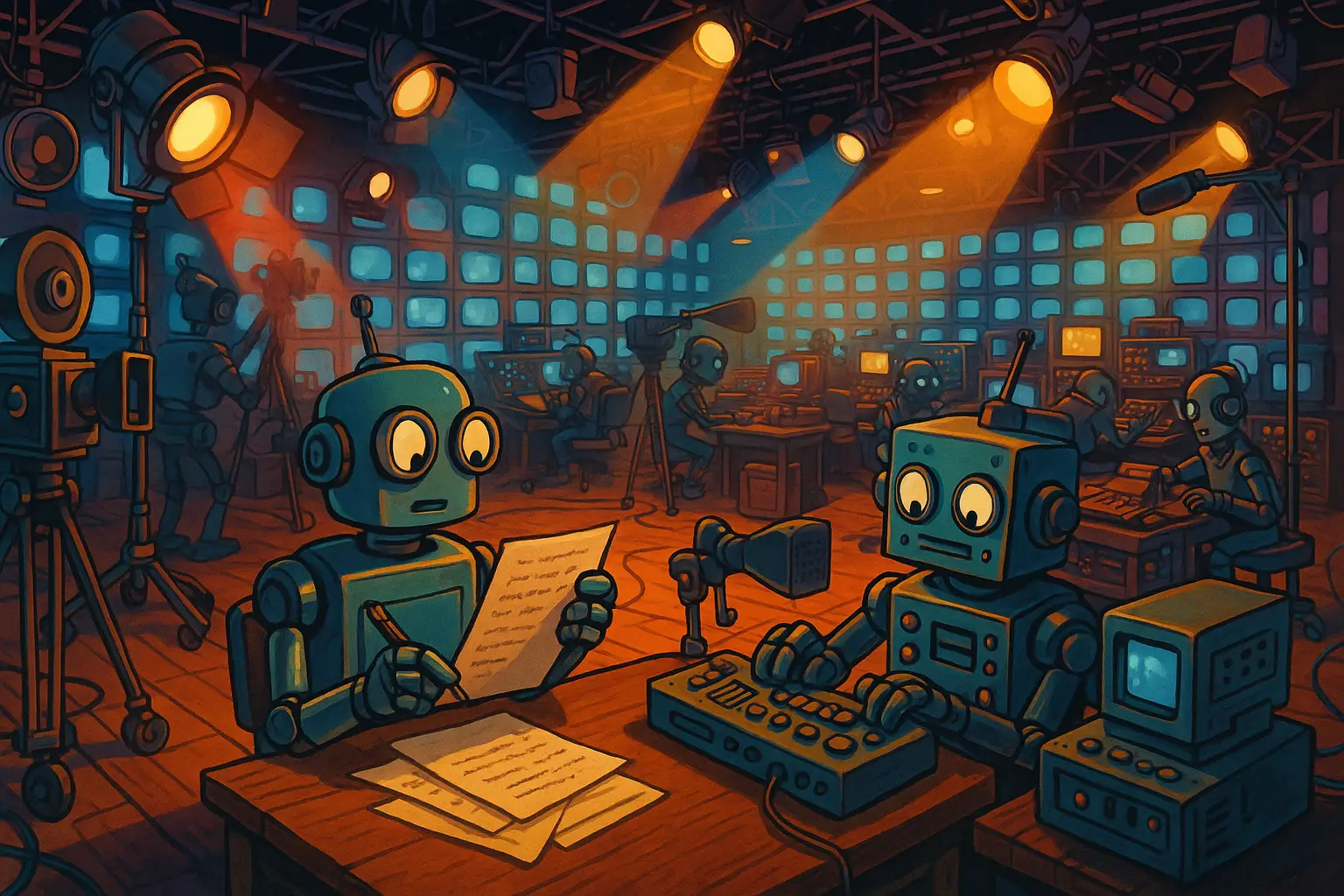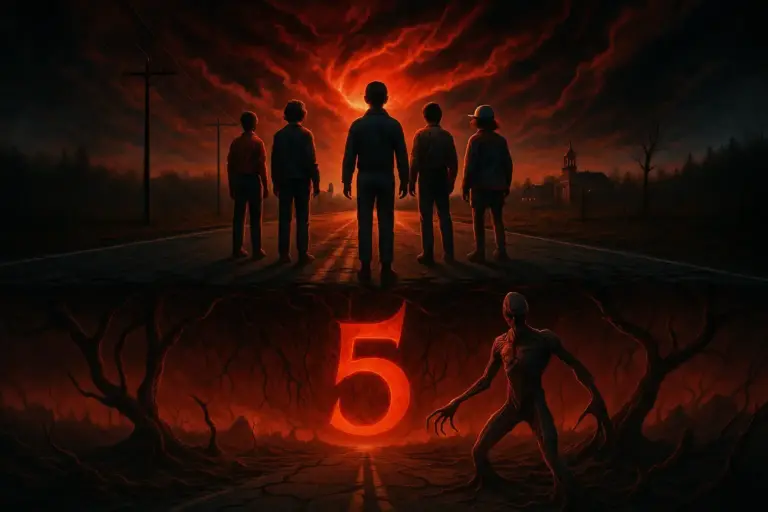Ever wonder if you’ll soon binge a hit show, only to realize no human wrote the script or built the sets? The TV world’s AI arms race is not a sci-fi plot, it’s happening right under our noses. While that’s either exciting or terrifying depending on who you ask, nobody can deny this: Hollywood, streaming giants, and even the office down the hall at your local ad agency are all cozying up with artificial intelligence in 2025. And somehow, it’s still only halftime.
AI Has Entered the Chat — and the Cutting Room
Remember when computer effects meant a cheesy green-screen backdrop? Those days are toast. Now, 70% of production companies use AI tools somewhere in their workflow, says Zipdo. That number feels big because it is! This tech wriggles into nearly every aspect of TV production, from the very first table read to the final “now streaming!” push notification.
- Pre-production? AI can “season” scripts, fill in background chatter, or even suggest casting.
- Mid-shoot? Weather’s wild, but AI forecasts keep rooftop scenes on track. Plus, directors use AI to design virtual sets — no more dragging flats in and out of a warehouse.
- After the director calls cut? Editors use AI for rotoscoping or to fix “uh-oh” moments with AI voice clones. Editing costs have sunk by about 25% for almost half the broadcasters, according to those same Zipdo stats.
- Accessibility? AI cranks out subtitles and transcriptions, now in use for a whopping 85% of new releases.
And don’t forget us — the couch potatoes. Now, 60% of us trust AI algorithms to recommend what to watch. That’s right: the “Are you still watching?” prompt is practically a digital BFF, and engagement skyrockets by over a third when AI serves the menu.
Fully AI-Generated TV: Science Project or Next Big Thing?
While the idea of bots dreaming up entire TV shows feels like an episode of Black Mirror, it’s already real. The biggest headline-grabber? Fable Studio’s Showrunner platform. In June 2024, Showrunner let users go wild: type in a plot, wait about five minutes, and you’ve got your own AI-generated episode — maybe starring vampires, cats, or potato chips that solve mysteries.
Showrunner isn’t shy about scale either. It launched with ten original series, including Exit Valley — a ruthless satire of Silicon Valley bosses — and Ikiru Shinu, an anime that gleefully mashes up genres. Fans can even push their favorite creations up a leaderboard, sparking mini-battles for fandom fame. For a segment of super fans, it’s like all-you-can-eat TV, tailored to every fleeting whim.
And if you’re rolling your eyes, let’s not forget Nothing, Forever, a show that’s essentially “AI Seinfeld” and has run continuously on Twitch since 2022. It delivers new, weird sitcom content 24/7. As of spring 2025, it’s clocked roughly three million views. Turns out, there’s a real market for “Jerry” and “Elaine” clones trapped in eternal reruns!
Even more, in 2025, experiments keep piling up. Midnight Bento — a late-night AI anime block — pops up on Japan’s NTV, while Code Cosmo, a zany, AI-animated kids series, debuts on France-Televisions. The robots are everywhere, and they’re not even pretending to hide.
Backlash on Blast: “AI Slop,” Anyone?
Of course, not everyone’s lining up for an all-robot writers’ room. Enter the ‘AI slop’ backlash. This phrase explodes across social media in early 2025 as viewers dragged AI-generated ads and spots through the virtual mud.
Remember Coca-Cola’s holiday ad blitz in late 2024? The brand dropped three commercials built almost entirely by AI. While execs chalked it up to tech fun, a tidal wave of artists — and even a few showrunners — dragged the move. Alex Hirsch (creator of Gravity Falls) wasn’t coy. He slammed the campaign online, roasting Coke for skipping the human touch. Even with corporate calm in the face of the uproar, that icy reception kept social feeds buzzing for weeks.
The robots didn’t catch many breaks elsewhere. In March 2025, Paramount tried to hype its thriller Novocaine with an Instagram video, only to be shredded for its robotic narrator. Fans blasted the clunky AI voice, comparing the ad to spam content. The PR team probably wished their AI could turn off notifications.
It didn’t stop at video, either. When A24 released AI-generated posters for its 2024 hit Civil War, fans howled. There were hashtags, boycott threats, and still — ironically — the film soared at the box office. This messy love/hate drama is the industry’s yin and yang.
Writers, Labor, and The Great AI Negotiation
Unions haven’t sat this one out. Writers and crew drew clear battle lines over AI in the past two years. Remember that mega WGA strike in 2023? Those negotiations forced studios to declare when AI wrote or rewrote scripts. They also banned giving AI writing credit. That’s a win, or at least a time-out until the next showdown.
Actors got their say, too. The 2023 SAG-AFTRA deal baked in digital-replica protections — actors can’t have their faces remixed into endless seasons without consent. Crew members (think IATSE) hammered out a “no displacement” agreement in 2024, so studios can’t ditch human staff for bots. There’s even a joint AI transparency committee in Hollywood now, plus a handy 7% wage bump to sweeten the pot.
And yes, directors are next. Rumor has it, the Directors Guild debates strict rules against “style clone” tools — nobody wants their signature camera swoosh turned into a sharingan power by some algorithm.
The Big Ethical Maze: Whose Story Gets Told?
Here’s one knot nobody’s untangled yet: When an LLM (language-learning model) spits out a killer one-liner, who owns it? The person who typed the prompt? The studio funding the cloud bill? Or the team who trained the bot on every 90’s sitcom ever?
Academics add to the skepticism. A USC Annenberg study out this February found AI-generated scripts underrepresented non-binary characters by 68%. So, those who hoped machines would shake up stale TV tropes? Not so fast. Bias runs deep — often hiding unnoticed inside the code.
Deepfakes and “fake friends” keep popping up too. TikTok’s 2025 “AI Friends” micro-drama led straight to a federal probe. US regulators scramble to write new rules about AI disclosure, especially for anything hitting primetime.
Europe? Already a step ahead. The AI Act, passed in May 2024, classifies fully synthetic news as “high risk.” Fiction escapes the red tape — for now — but must feature visible watermarks noting AI involvement. You can bet this playbook will soon catch on worldwide.
Market Madness: All In on Automated Everything
One thing’s sure: There’s real money behind the AI TV boom. Analysts peg the AI-in-media market at $1.62 billion by 2026, with a dizzying 35% growth rate. Nvidia, the chip giant, keeps slicing costs so fast that every update brings cheaper, faster content generation — down around 40% per minute just this year.
Tech breakneck speed and relentless rollout mean execs must choose between innovation sprints and audience trust. For now, big platforms mostly lean towards AI-enhanced, not AI-only. But in niche corners — late-night Twitch, mini streaming apps, weird YouTube creators — the bots have already moved in.
So, What’s Next? Five Ways the Script Could Flip
Feeling a bit unnerved? Let’s guess how this all plays out. Here are the current paths on the whiteboard in every Hollywood meeting:
- Human-led but “AI on rails”: Most movies and shows stay familiar, with robotic assistants handling the slog work, not the glory.
- New niche content: Hyper-personalized, AI-only streams amuse and baffle us late at night, but rarely top the charts.
- Mainstream experiment: A streamer drops a totally AI-helmed “event” episode, just for shock and awe, by 2026 maybe?
- Viewers push back: “Handmade” TV becomes a hip selling point, like farm-to-table food. Suddenly, “written by a real person” feels arty.
- Rulebook grows: Legal musts (like watermarks) slow the robot rush, at least for a while.
How’s This Hit Our Fave Shows?
All right, let’s bring this home to [Show Name]’s fandom. There are upsides. Imagine bonus mini-episodes during the off-season, or recaps with multiple possible endings, so every shipper gets their wish. These tools could feed fans between seasons or let stories branch like a choose-your-own-adventure.
The trade-off? Studios might use algorithms to trim the writers’ room headcount. That could mean fewer weird, human moments — the kind that fuel online fan memes and epic Twitter threads.
Roll Credits…or Maybe Hit “Generate” Again?
Bottom line: We’re zooming straight into a world where creativity and computers don’t just overlap — they high-five. Some stories will spring from code. Others will fight for a personal touch, maybe even get labeled “writer-grown, not AI-churned” like organic cauliflower.
So, don’t switch channels just yet. Next time you’re bingeing [Show Name], imagine an AI-penned what-if episode — a bottle show where your OTP gets stuck in a malfunctioning smart fridge. Drop your best prompt in the comments. The future of TV? It could be yours to co-write.





